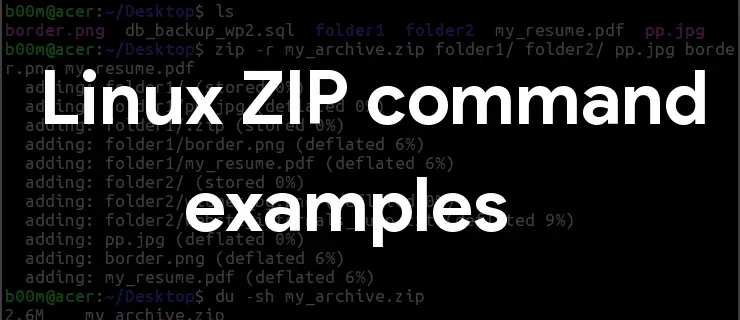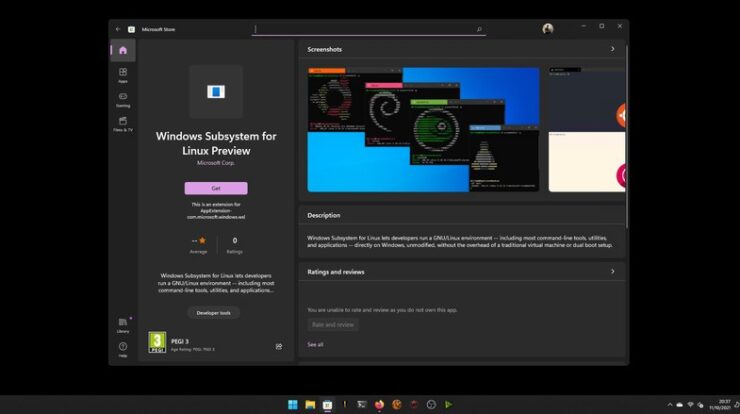
Page Contents
- 1 Introduction
- 2 How to Use Unzip in Linux?
- 3 Debian and Ubuntu System
- 4 Install Unzip on Fedora and Linux CentOS
- 5 How to Use and operate Unzip and Zip in Linux
- 6 How to Revamp Zip Files
- 6.1 Transfer a File to a Zip
- 6.2 Recurring Usage of zipping on Linux
- 6.3 Eliminated Files in a Zip
- 6.4 Unzip to an Additional Directory
- 6.5 Use Unzip with Considerably multiple Zip Files
- 6.6 Repress Output When Operating Unzip in Linux
- 6.7 Eliminate Files Using Unzip in Linux
- 6.8 Using Unzip in Linux with Password-Protected Files
- 6.9 Overriding Zip Files
- 7 How to Document the Content of a Zip in Linux
- 8 Verdict
Introduction
Zip is the most manipulated cross-platform command for data compacting and archiving. Deduction conserves space by compressing data while archiving facilitates transfer by joining respective folders or folders into one file. Suppose the following system: if we require to transmit five files over the internet, individually of which is a hundred megabytes in size, transferring separately file one by one may take an extended time. It could be faster to copy the files if shortened to up to 60 MB and then archive them in one file than if they are not clipped. Unzip is operated to rescue and decompress zipped files. Zip is the considerable typically performed utility for archiving and reducing files. So in this article, we will prepare you with brief details about unzipping and zipping the files in Linux.
UnZip and zip command in Linux
How to Use Unzip in Linux?
Zipping and unzipping files reduce an excess of complex jobs like file transfer! Here we will assist you in operating unzip in Linux to enhance your VPS workflow!
Zip is a commonly operated compression function that is portative and comfortable. You can unzip files in Windows that were constructed in Linux!
Unzip is a value not known on most Linux flavors by default while easy to install. By constructing .zip files, you can compare .tar.gz file compression!
Downward are occasional scenarios in which you may prefer to use zip files:
I. When you are continually operating between Windows and Unix-based networks. This compresses files, but it is also a file package utility. Works on multiple functioning systems
II. To preserve bandwidth. If you have specified or bounded bandwidth, zip can be utilized between two servers for file transportation.
III. Transfers files fast. Zip utility lessens file size, therefore decreasing the transfer period.
IV. Upload or download directories at a quicker rate
V. Conserve disk space
VI. Unzip password-protected .zip files
VII. Appreciate a suitable compression ratio
Place, before accepting advantage of Unzip on Linux, and you’ll keep to SSH into your VPS server system.
Debian and Ubuntu System
Establishing unzip is effortless! With Ubuntu and Debian, utilize the command below to install unzip:
sudo apt install unzip
Model before and stay a minute until the installation is completed.
To construct zip files, you’ll also maintain to install zip. You can accomplish this with the subsequent command:
sudo apt-get install zip
Install Unzip on Fedora and Linux CentOS
This is also easy and can be accomplished using the down command:
sudo yum install unzip
When the installation is finished, you can review the track with the following command:
which unzip
Behind you manage the directive in the command line, you should obtain an outcome that looks like this:
/usr/bin/unzip
You can even ensure everything is installed perfectly by using the command given below. It will provide a lengthy with unzipping utility points.
unzip –v
How to Use and operate Unzip and Zip in Linux
Currently, we know how to install the Zip and Unzip files, we can begin understanding its preliminary uses of it:
Create Zip Files in Linux
The essential syntax to construct a .zip file is:
zip alternatives zip file list_Of_files
To try this, we formed two files – Example.File.txt and Example.File1.txt. We’ll compress them into sample.ZipFile.zip with the subsequent command:
zip sample.ZipFile.zip Example.File.txt Example.File1.txt
Operating Linux to Unzip a file
The unzip command can be operated without any alternatives. This will unzip all files and folders to the current directory. One such sample is as shown below:
unzip sampleZip.File.zip
by default, this will be unzipped in the existing folder provided you retain read-write access.
Terminate a File from a .zip File.
Earlier, a .zip file was constructed. You can terminate or delete files in it. So, if you desire to delete Example.File.txt from the existent sample.ZipFile.zip, then you can use the subsequent command:
zip –d sample.ZipFile.zip Example.File.txt
If this command is executed, you can unzip the .zip file operating: unzip sample.ZipFile.zip
Over here, you will encounter that Example.File.txt has been terminated and can’t be noticed on extraction.
How to Revamp Zip Files
Earlier, a .zip file was created. You can add a renewed file to an existing .zip file. Assume a new file Example.File2.txt must be counted to the existing sample.ZipFile.zip. You can do this with the command given below:
zip –u sample.ZipFile.zip Example.File2.txt
If you extract sample.ZipFile.zip, you will encounter the new file Example.File2.txt added.
Transfer a File to a Zip
You can transfer graphic files to the zip file. Behind adding the files, they will be terminated from their original directories. This is mainly utilized when you have a considerably large file or directory but require to save disk space. This is accomplished by counting the option. A sample of this command is given below:
zip –m sample.ZipFile.zip Example.File2.txt
Recurring Usage of zipping on Linux
The -r option is operated to recurring zip files. This option will shorten all the files within a folder. A sample of such a command is given below:
zip –r sample.ZipFile.zip MyDirectory
MyDirectory has multiple large files and sub-directories to be zipped
in the sample.
Eliminated Files in a Zip
While constructing a .zip file, you can eliminate unwanted files. This is accomplished by using the -x option. There is an example given below:
zip -x sample.ZipFile.zip Example.File.txt
Here Example.File.txt will not be counted to the sample.ZipFile.zip.
Unzip to an Additional Directory
This can even be accomplished if you do not want to unzip to the current directory but select a directory. Utilize the -d option to feed a directory track in the unzip command. An example of such a command is given below:
unzip sampleZipFile.zip -d /usr/sampleZip/ExampleDir
Use Unzip with Considerably multiple Zip Files
If you desire to unzip multiple zip files living within your existing working directory, then you can operate a command is given below:
unzip ‘*.zip.’
This command will unzip all the separate zip files.
Repress Output When Operating Unzip in Linux
By defaulting, when we use the unzip command, the command marks a checklist of all the files accumulating extracted. An outline of the extraction procedure is printed. If you desire to repress these notifications, you can utilize the -q option. The command would be given below:
unzip -q sample.ZipFile.zip
Eliminate Files Using Unzip in Linux
In point you want to remove all files besides for one, then you can use a similar command as given below:
unzip sample.ZipFile.zip -x excluded.File.txt
Here the command will unzip all files besides excluded.File.txt.
You can again control typical file types from getting extracted. One such sample is as shown below:
unzip sample.ZipFile.zip -x “*.png/*”
The overhead command will ban all .png files from being extracted.
Using Unzip in Linux with Password-Protected Files
A password-protected .zip file can be de-stress using the -P option. An example of such a command is as given below:
unzip -P Password sample.ZipFile.zip
Password will exist the Password for the .zip file in the overhead command.
Overriding Zip Files
When you unzip the exact file again in the precise location where the file was removed, by default, you will experience a notification asking whether you desire to overwrite the existing file, overwrite all files, reflect extraction for the current file, reflect extraction for all files or rename the existing file.
The options would be as given below:
[Y]es, [N]o, [A]ll, [N]one, [R]ename
You can override these files by employing the -o options. One such example is as given below:
unzip -o sample.ZipFile.zip
While accomplishing this command, the alert should be carried out since this will ultimately overwrite the current copies. Any modifications made in the premature document will be overwritten.
Using Linux Unzip Without Overwriting Files
If you have unzipped a file and constructed some modifications but incidentally deleted periodic files, then you can utilize this technique to revive it! Use the -n option to ignore the extraction if a file exists. So actually, just files that do not exist will be removed. A sample of such command is shown below:
unzip -n sample.ZipFile.zip
How to Document the Content of a Zip in Linux
The -l option will record all the files within the .zip, timestamp, and additional necessary details. An example of such a command is given below:
unzip -l sample.ZipFile.zip
Verdict
Unzip is a valid command used to document, test, and extract different compact ZIP archives. The zip command compresses the files within the Linux operating system. Hence, we have protected various operations associated with unzipping and comprehended how each differs, relying on their command and wildcards usage.





